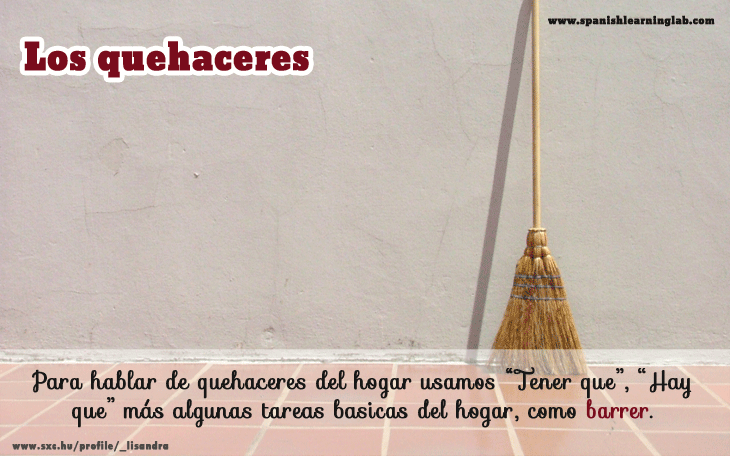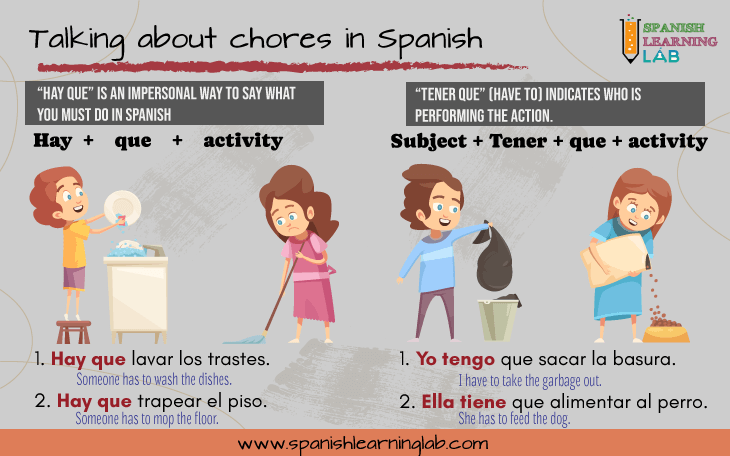¿Qué tareas domésticas te gusta hacer? “Los Quehaceres”, “Las tareas del hogar” and “Los oficios de la casa” are three ways to refer to household chores in Spanish. This lesson will introduce the vocabulary for these tasks through a short video and several mini-conversations. In addition, we will discuss about ways to express obligations in Spanish using “Tener que”, “Hay que” and “Deber”. Comencemos…
Vocabulary Introduction: A list of chores in Spanish
First, we will watch a short video introducing a list of chores in Spanish. These words will be used later in short conversations. The video consists of pictures representing different chores as well as some useful questions and phrases related to these new words. In addition, it contains a few grammar notes explaining how the examples work. The video is only in Spanish so it will be a good opportunity to practice listening. You can activate the captions (cc) if you need them.
HAY QUE + Infinitive for obligations in Spanish
LOS QUEHACERES or household chores in Spanish are just verbs indicating a simple action like LIMPIAR (to clean), “LAVAR” (to wash) and so on. We will relate the vocabulary for these tasks with verbs used to express obligations in Spanish as they are often connected in real life. In order to say what someone has to do in Spanish, three verb forms can be used: HAY QUE, TENER QUE and DEBER.

Let’s discuss HAY QUE + infinitive for expressing obligations in Spanish. HAY comes from the verb HABER and means THERE IS/THERE ARE, but when it is accompanied by the word QUE it means something different: HAVE TO. The phrase HAY QUE is normally used to express obligations in Spanish without specifically saying who has to do a task or chore in this case, so it is somewhat impersonal e.g.: “Hay que lavar los trastes” (someone has to wash the dishes) and “Hay que cocinar” (someone has to cook).
Exmaple No. 1
- Jack: ¡y…! ¡La casa está súper sucia!
- Xochilt: Si, ni lo menciones. Hay que limpiar ahorita.
- Jack: Hay que mover estos muebles primero.
- Xochilt: Te dejo eso a ti. Yo tengo que lavar los trastes y arreglar la cocina.
Exmaple No. 2
- Jack: ¿Qué estás haciendo?
- Xochilt: Estoy cocinando el desayuno para los niños.
- Jack: ¿Te ayudo a lavar los trastes?
- Xochilt: Si por favor… También hay que sacar la basura ¿Lo puedes hacer?
- Jack: Si, no hay problema
TENER QUE + Infinitive to express obligations in Spanish
Now, let’s talk about TENER QUE. TENER means “to have” in Spanish and it happens to be an irregular verb too, just like HABER, so it will change a little depending on the subject of the sentence, e.g. Yo tengo, tú tienes and so on. We normally add the word QUE after the conjugation of TENER to express obligations in Spanish. Basically, the grammatical structure will be:

Example No. 3
- Xochilt: Tú tienes que hacer las compras hoy.
- Jack: Está bien. ¿Qué quehaceres tienes que hacer esta mañana?
- Xochilt: Bueno, solo tengo que barrer y trapear el piso, entre otras cosas.
- Jack: ¡Ya es tarde! Al menos voy a ayudarte a regar las plantas.
Example No. 4
- Xochilt: Jack, ¿Ya hiciste la cama?
- Jack: Si, no te preocupes.
- Xochilt: Recuerda limpiar tu habitación después. ¿Tienes ropa sucia?
- Jack: Si, tengo que lavar mi ropa hoy porque ya no tengo ropa limpia.
- Xochilt: Mientras tanto, yo voy a poner la mesa.
Using DEBER to say “You must…” in Spanish
Finally, the last verb we will discuss is DEBER. It is very easy to express obligations in Spanish with DEBER because it acts just like the modal verb MUST from the English language. DEBER is a regular verb so we just need to follow some rules to use it correctly, and unlike TENER and HAY, it will not need the word QUE. Here are two examples using DEBER in Spanish:
- “Yo debo hacer la hacer las compras”
- “Tú debes regar las plantas”.
Language tip:
It is common to use IR A + a chore to say what you will do later. We use IR A meaning going to in Spanish. Just remember that IR is an irregular verb, so it is really important to use the right conjugation for each subject pronoun, e.g. “Yo voy a…”, “tú vas a…” and so on.
Listening Activity No. 1: What are your chores in Spanish?
Key expressions in the conversation:
- ¿Por qué preguntas? means “Why do you ask?”
- La casa está hecha un desastre means “The house is a total mess”
- Manos a la obra means “Down to work”
Listening Activity No. 2: Finding the right household chores in Spanish
Listen to another short conversation about household chores in Spanish. Listen to it and try to find the main idea. Then choose the summary that best describes the house they are talking about and the chores (quehaceres) that need to be done. Make sure to listen to the audio carefully, so you can select an appropriate description.
Lesson assignment:
Make a list of household chores in Spanish you do at home. It can be make-believe. You could use sequence words like PRIMERO, LUEGO and POR ÚLTIMO to make your sentences follow a specific order.